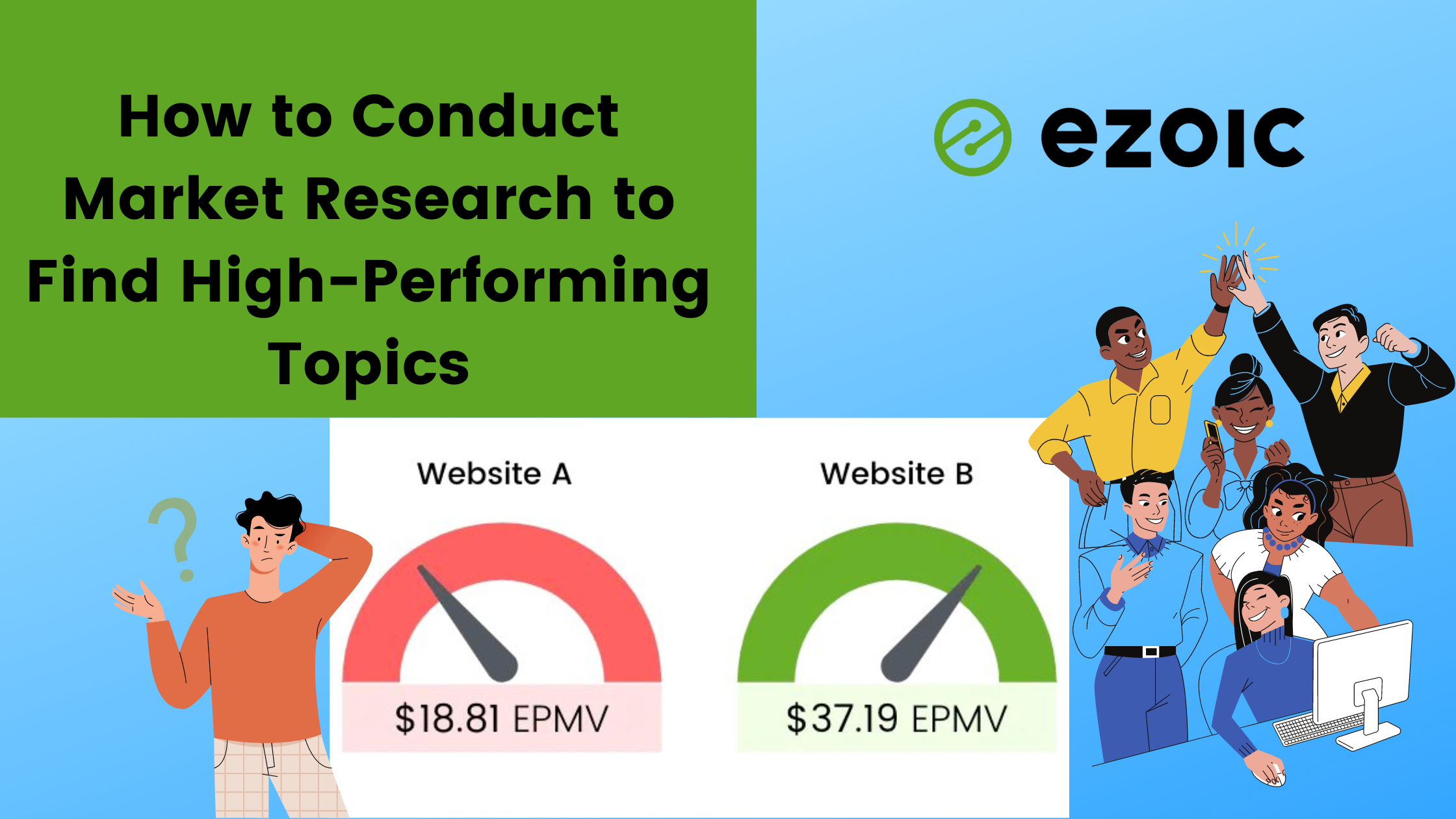Dwayne Lefleur, founder and CEO of Ezoic, recently brought light to an eye-opening truth every publisher needs to hear:
Niches don’t earn money; sites do.
It can be so easy to think that specific niches will make you a ton of money, just through their popularity alone, no market research or much planning required. That if you could only make a site in that niche, you’d instantly start earning a ton of revenue.
It’s understandable. Every day there are countless spikes in traffic to hyper-trendy niches like real estate, world news, sports, politics, etc. These niches have millions (probably tens of millions) of daily readers, and it can be easy for a publisher to begin thinking that specific niches simply earn more money than others on average.
But this isn’t true.
As you can see from this chart comparing multiple sites in the same niche, there are wildly fluctuating EPMVs and RPMs that have very little to do with niche and a lot to do with more intangible factors like passion, expertise, experience, and authority:
Furthermore, assessing the viability of niches based on EPMV numbers is deceptive and unreliable. This is a bit like predicting a person’s health based on what kind of protein shake they drink; health is determined by countless factors like genetics, exercise, diet, etc. The person and people behind a site dictate far more success than a niche itself:
True, niches that are too granular probably have less overall traffic and potential revenue than broader niches, but to try and seek out “the most profitable niches” is approaching the issue the wrong way. Furthermore, just because you discover a trendy niche that is currently getting a lot of traffic doesn’t mean it’s a slam dunk for earning revenue; you have to actually be an expert (and liking the topic is important too).
Remember: niches don’t earn money. Sites do. You can build an extremely profitable site in a lower-trafficked niche, and spend years building up a site in a popular niche that barely earns any revenue.
Some of the world’s most lucrative, successful publishers do indeed own a variety of sites across a variety of niches based on market research, and this is a successful strategy if you know how to set up sites in the right niches for you.
How to Find Niches Where You Could Realistically Build a Truly Great Site
I had a friend in college who chose to study engineering. Why? He told us he heard engineers had great job prospects out of college. But his extreme disinterest in the coursework and industry plagued him for three years before his poor grades finally convinced him to change majors to a field he actually liked.
Don’t chase the money.
When it comes to determining niches where you have a realistic chance of building a truly lucrative, high-trafficked site, there’s an important set of questions to ask yourself before deciding on a new site.
First, make a list answering the following questions:
- What niche are you (or soon could be) an expert in?
- Of these, what niches are you most familiar with?
- Of these, what niches are you most passionate about?
- What specific points of these niches are you an expert in?
- Of these, what parts are you most experienced to help your audience with?
You may find your answers don’t align with trendy niches that are dominating headlines right now. That’s OK. You can build a site in a popular niche and still get virtually no traffic. You can also build a wildly successful site in a very niche topic and earn more revenue than most other publishers through great market research.
The next steps to creating sites in multiple niches are to build a system where you can realistically build a great site (remember: niches don’t make money, sites do!). This is a bit like opening a second location for a successful restaurant; it’s going to need a whole new team and strategy to be successful at the new location. One cook won’t be enough.
You can start developing this system now. To do this, start developing relationships with experts in that niche that could contribute to your site’s growth.
I successfully built several new sites in very different niches: personal growth, career coaching, finance, etc. In the beginning, I definitely wasn’t an expert in these fields, so I began learning and connecting with people who were. I read books, studied other sites in that niche, and modeled my work after them. I began hiring other writers and creators to help me establish authority.
Soon, the sites were running themselves, and after I had conducted good market research I had switched from “publisher” to “owner,” where instead of creating all the content myself (I only had so much time and energy in the day to write), I could reinvest the profits from my business to pay for writers and developers to run the site for me.
Use a Tool That Does the Work For You
MJ DeMarco tells a fascinating parable in his book The Millionaire Fastlane.
An ancient Egyptian pharaoh summons his two nephews Chuma and Azur and tasks them each with building an enormous pyramid, granting kingship to whomever completes the task first. Both ambitious and eager to succeed, the brothers set out to accomplish their task.
Azur begins immense physical training to become strong enough to lift the gigantic boulders and stones required to build a pyramid. He begins making progress, manually cutting and lifting each stone to build his pyramid base.
As the weeks go by, Chuma appears to have done nothing. He spends all his time building a complicated contraption with pulleys, levers, and ropes. Azur criticizes Chuma’s lack of effort and progress; Chuma quietly works on his creation.
Months go by. Azur is making more progress, but the higher he builds the pyramid, the harder it is to manually carry the heavy boulders up the steep incline of his pyramid. He’s exhausted, but his answer is to train his body more to become stronger.
One day, a cheer erupts at Chuma’s pyramid. He’s finally completed his state-of-the-art machine that lifts boulders for him. He quickly built a pyramid higher than Azur’s, barely breaking a sweat. He completes the pyramid in record time and becomes king of the land.
This is the power of automation.

Aj Angoluan, CEO and founder of Rockstar Funnel Builders, was asked about using the power of automation to help your business: “Let’s get straight to the point: human or automation? The answer is always ‘both.’ You can’t run your business without human power as well as automation power.”
The more you can outsource and automate core functions of your site, the more time and energy you’ll have to create content and build a successful site. One person simply cannot run multiple enormous sites and maximize revenue; successful sites require a large amount of content, search engine optimization, and on-the-fly decisions about how to get more traffic. You can do a lot of this yourself, but the enormity of this task will begin taking a serious toll on you.
Ezoic recently launched NicheIQ, one of the best free SEO toolkits on the market. Like Chuma’s machine in the parable, this toolkit helps you find great topics, conduct tests, and provide answers for your current and future sites. It automates the process, doing the heavy lifting in the background while giving you more bandwidth to build the site.
Add to the Automation By Conducting High-Level Market Research Yourself
While your machines are working in the background, it will behoove you to conduct some market research yourself. Multi-million dollar entrepreneur Dan Henry recommends doing some simple market research in your niche based on feedback, reviews, and popularity to determine the best way to create a site and content that already demands attention:
- Use Amazon to find books in your niche, and read reviews that reveal what readers want and don’t want from publishers
- Use YouTube to find popular channels in your niche and see what these creators talk about, as well as what the top comments are asking for
- Scan through forums and message boards in your niche to see what the most talked-about conversations are from the readers in that niche
- Analyze the top influencers in that niche and see what topics they cover the most, and their most-asked and most-answered questions
- Join online communities like Facebook groups to see some of the most common issues, needs, and desires from that niche’s audience
Market research isn’t sexy work. You might even be thinking, “Duh. I already knew that. What else ya got?” This might not be the most groundbreaking advice you’ve probably read.
But it does work. Your success as a publisher depends on knowing what your audience wants, and your ability to deliver that content to them. I remember auditioning to play drums for my local church while I was in high school, but being told I wasn’t good enough at that time to play; they recommended I enter the drum line, polish my techniques, and audition again. So that’s what I did; after I got a better understanding of drums, I passed the audition and became their drummer.
This kind of field work isn’t as exciting or fancy, and probably wouldn’t get a lot of attention if you posted about it on social media. But this is the groundwork that gets you where you want to go, and you can’t build a truly great site without knowing these insights to apply in your content.
In Conclusion
Don’t fall into the trap thinking niches alone can give you the revenue you want; niches don’t make revenue, sites do — and the publishers behind the site. Use real market research to determine this data yourself.
Our Ezoic leadership team spends a ton of time executing our strategies, building products, and delivering great services to users like you. But they also continually regroup, analyze data, and base their decisions on their findings. This is true for any great company or venture, and it’s true for publishing as well. The best decisions are based on real data and market research, and it’s a high-level behavior practiced by the world’s most successful publishers.
You don’t have to do all the work yourself; use tools like NicheIQ and automation systems that conduct market research for you while you’re evolving from a creator to an owner of multiple sites.


